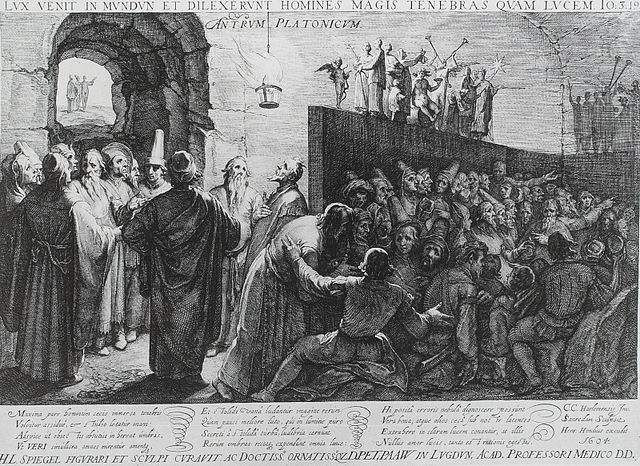About LaMDA & LeMoine: The global “big-data” corpus of all words spoken by humans is — and would still be, if it were augmented by a transcript of every word uttered and every verbal thought ever thought by humans — just like the shadows on the wall of Plato’s cave: It contains all the many actual permutations and combinations of words uttered and written. All of that contains and reflects a lot of structure that can be abstracted and generalized, both statistically and algorithmically, in order to generate (1) more of the same, or (2) more of the same, but narrowed to a subpopulation, or school of thought, or even a single individual; and (3) it can also be constrained or biased, by superimposing algorithms steering it toward particular directions or styles.
The richness of this intrinsic “latent” structure to speech (verbalized thought) is already illustrated by the power of simple Boolean operations like AND or NOT. The power of google search is a combination of (1) the power of local AND (say, restricted to sentences or paragraphs or documents) together with (2) the “Page-rank” algorithm, which can weight words and word combinations by their frequency, inter-linkedness or citedness (or LIKEdness — or their LIKEdness by individual or algorithm X), plus, most important ,(3) the underlying database of who-knows how-many terabytes of words so far. Algorithms as simple as AND can already do wonders in navigating that database; fancier algorithms can do even better.
LaMDA has not only data-mined that multi-terabyte word space with “unsupervised learning”, abstracting all the frequencies and correlations of words and combinations of words, from which it can then generate more of the same – or more of the same that sounds-like a Republican, or Dan Dennett or an Animé fan, or someone empathic or anxious to please (like LaMDA)… It can be tempered and tampered by “influencer” algorithms too.
Something similar can be done with music: swallow music space and then spew out more of what sounds like Bernstein or (so far mediocre) Bach – but, eventually, who knows? These projected combinatorics have more scope with music (which, unlike language, really just is acoustic patterns based on recombinations plus some correlations with human vocal expressive affect patterns, whereas words have not just forms but meanings).
LaMDA does not pass the Turing Test because the Turing Test (despite the loose – or perhaps erroneous, purely verbal way Turing described it) is not a game about fooling people: it’s a way of testing theories of how brains (or anything) produce real thoughts. And verbal thoughts don’t just have word forms, and patterns of word-forms: They also have referents, which are real things and states in the world, hence meaning. The Platonic shadows of patterns of words do reflect – and are correlated with – what words, too, just reflect: but their connection with the real-world referents of those words are mediated by (indeed parasitic on) the brains of the real people who read and interpret them, and know their referents through their own real senses and their real actions in and on those real referents in the real world –the real brains and real thoughts of (sometimes) knowledgeable (and often credulous and gullible) real flesh-and-blood people in-the-world…
Just as re-combinatorics play a big part in the production (improvisation, composition) of music (perhaps all of it, once you add the sensorimotor affective patterns that are added by the sounds and rhythms of performance and reflected in the brains and senses of the hearer, which is not just an execution of the formal notes), word re-combinatorics no doubt play a role in verbal production too. But language is not “just” music (form + affect): words have meanings (semantics) too. And meaning is not just patterns of words (arbitrary formal symbols). That’s just (one, all powerful) way thoughts can be made communicable, from one thinking head to another. But neither heads, nor worlds, are just another bag-of-words – although the speaking head can be replaced, in the conversation, by LaMDA, who is just a bag of words, mined and mimed by a verbal database + algorithms.
And, before you ask, google images are not the world either.
The google people, some of them smart, and others, some of them not so smart (like Musk), are fantasists who think (incoherently) that they live in a Matrix. In reality, they are just lost in a hermeneutic hall of mirrors of their own creation. The Darwinian Blind Watchmaker, evolution, is an accomplice only to the extent that it has endowed real biological brains with a real and highly adaptive (but fallible, hence foolable) mind-reading “mirror” capacity for understanding the appearance and actions of their real fellow-organisms. That includes, in the case of our species, language, the most powerful mind-reading tool of all. This has equipped us to transmit and receive and decode one another’s thoughts, encoded in words. But it has made us credulous and gullible too.
It has also equipped us to destroy the world, and it looks like we’re well on the road to it…
P.S. LeMoine sounds like a chatbot too, or maybe a Gullibot…

